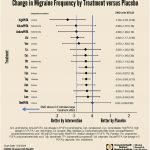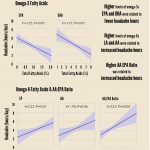Published on June 5, 2024
Research shows that omega-3 fatty acids, magnesium, and vitamin D may be helpful for those suffering from migraines and headaches
Key Points
- Published studies show how omega-3 fatty acids can help reduce headache frequency and severity, even outperforming other treatments and migraine medications
- Magnesium intake has been linked to migraine frequency and intensity
- Higher doses of vitamin D has helped many to successfully manage cluster and migraine headaches
 Migraines are among the most common chronic diseases worldwide, with many migraine sufferers experiencing high levels of pain and even disability, despite the use of medications. In fact, current pharmacologic treatments for migraine have been shown to have limited efficacy, poor response rates, and concerning safety profiles.
Migraines are among the most common chronic diseases worldwide, with many migraine sufferers experiencing high levels of pain and even disability, despite the use of medications. In fact, current pharmacologic treatments for migraine have been shown to have limited efficacy, poor response rates, and concerning safety profiles.
Several studies have shown that specific nutrients can be very beneficial for migraine and headache sufferers, including vitamin D, magnesium, and omega-3 fatty acids. In fact, a 2024 meta-analysis combining data from 40 randomized controlled trials showed that high doses of the omega-3 fatty acids DHA and EPA were best at decreasing the frequency and severity of migraines compared to other treatments.
Share these studies with others in June for National Migraine and Headache Awareness Month! What you share could make a difference in the lives of others.
New Meta-analysis Shows High Dose Omega-3s Outperform Migraine Medications
 Key Points
Key Points
- A 2024 network meta-analysis analyzed data from 40 randomized controlled trials (RCTs) involving participants with either episodic or chronic migraines; a total of 6,616 participants with an average age of 35 years old was included in the study
- The study found the highest decrease in migraine frequency and severity among those supplementing with high-dose EPA+DHA supplements (1500 mg/day of EPA+DHA or higher), as well as the best acceptability rates compared to other treatments
Increased Omega-3 Intake Shown to Reduce Headache Frequency and Severity
 Key Points
Key Points
- A previous study by Ramsden et al. found that both intake and blood levels of omega-3 and omega-6 fatty acids significantly affected migraines
- Migraine sufferers receiving 1.5 mg/day of EPA+DHA in their diet for 16 weeks had significantly decreased frequency and severity of headaches compared to the control group
- Higher blood levels of EPA and DHA were significantly related to less time with a headache per day, while higher levels of LA and a higher AA:EPA Ratio were significantly related to more time with a headache per day
Magnesium Linked to Reduced Migraine Frequency and Intensity
 Studies have shown that magnesium can help relieve migraine symptoms and reduce their frequency. A 2016 meta-analysis of 21 studies found that intravenous magnesium significantly alleviated acute migraine symptoms by about 75% both immediately (15-45 minutes) and longer term (24 hours). Oral magnesium, used for migraine prevention, was found to significantly reduce the frequency of migraines by 80% and the intensity of migraines by 78%.
Studies have shown that magnesium can help relieve migraine symptoms and reduce their frequency. A 2016 meta-analysis of 21 studies found that intravenous magnesium significantly alleviated acute migraine symptoms by about 75% both immediately (15-45 minutes) and longer term (24 hours). Oral magnesium, used for migraine prevention, was found to significantly reduce the frequency of migraines by 80% and the intensity of migraines by 78%.
Migraine and Cluster Headaches Helped with Vitamin D
 The “Vitamin D Anti Inflammatory Regimen,” discussed in a video interview with Dr. Bruce Holis, has helped many to successfully manage their cluster and migraine headaches. It includes doses of vitamin D to achieve levels above 100 ng/ml (250 nmol/L), along with magnesium supplementation and monitoring for any signs of toxicity. As stated by host Craig Stewart, “It is my hope sufferers will watch this and realize it is a safe and effective treatment option and everyone realizes the importance of maintaining physiological levels of Vitamin D.” This video is definitely worth the watch!
The “Vitamin D Anti Inflammatory Regimen,” discussed in a video interview with Dr. Bruce Holis, has helped many to successfully manage their cluster and migraine headaches. It includes doses of vitamin D to achieve levels above 100 ng/ml (250 nmol/L), along with magnesium supplementation and monitoring for any signs of toxicity. As stated by host Craig Stewart, “It is my hope sufferers will watch this and realize it is a safe and effective treatment option and everyone realizes the importance of maintaining physiological levels of Vitamin D.” This video is definitely worth the watch!
Make Sure You Are Getting Enough Vitamin D and Other Important Nutrients – Test At Home!
 Having and maintaining healthy vitamin D levels and other nutrient levels can help improve your health now and for your future. Choose which additional nutrients to measure, such as your omega-3s and essential minerals including magnesium and zinc, by creating your custom home test kit today. Take steps to improve the status of each of these measurements to benefit your overall health. With measurement you can then determine how much is needed and steps to achieve your goals. You can also track your own intakes, symptoms and results to see what works best for YOU.
Having and maintaining healthy vitamin D levels and other nutrient levels can help improve your health now and for your future. Choose which additional nutrients to measure, such as your omega-3s and essential minerals including magnesium and zinc, by creating your custom home test kit today. Take steps to improve the status of each of these measurements to benefit your overall health. With measurement you can then determine how much is needed and steps to achieve your goals. You can also track your own intakes, symptoms and results to see what works best for YOU.
Enroll in D*action and Test Your Levels Today!





